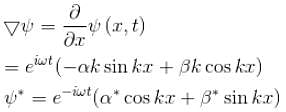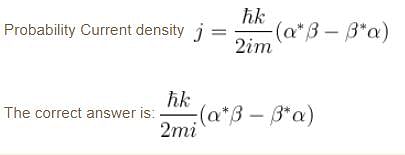Physics Exam > Physics Questions > A particle of massmhas the wave functionψ...
Start Learning for Free
A particle of mass m has the wave function ψ(x, t) = eiωt (α cos kx + β sin kx) where α, β are complex constants and ω and k are real constants. The probability current density is equal to :
- a)

- b)0
- c)

- d)

Correct answer is option 'A'. Can you explain this answer?
Verified Answer
A particle of massmhas the wave functionψ(x, t) = eiωt (&alp...
Probability current density 



subtract (2) and (1)





subtract (2) and (1)

Most Upvoted Answer
A particle of massmhas the wave functionψ(x, t) = eiωt (&alp...
Probability current density 



subtract (2) and (1)





subtract (2) and (1)

Free Test
FREE
| Start Free Test |
Community Answer
A particle of massmhas the wave functionψ(x, t) = eiωt (&alp...
Probability current density 



subtract (2) and (1)





subtract (2) and (1)


|
Explore Courses for Physics exam
|

|
Similar Physics Doubts
A particle of massmhas the wave functionψ(x, t) = eiωt (αcos kx +βsin kx)whereα,βare complex constants andωandkare real constants. The probability current density is equal to :a)b)0c)d)Correct answer is option 'A'. Can you explain this answer?
Question Description
A particle of massmhas the wave functionψ(x, t) = eiωt (αcos kx +βsin kx)whereα,βare complex constants andωandkare real constants. The probability current density is equal to :a)b)0c)d)Correct answer is option 'A'. Can you explain this answer? for Physics 2025 is part of Physics preparation. The Question and answers have been prepared according to the Physics exam syllabus. Information about A particle of massmhas the wave functionψ(x, t) = eiωt (αcos kx +βsin kx)whereα,βare complex constants andωandkare real constants. The probability current density is equal to :a)b)0c)d)Correct answer is option 'A'. Can you explain this answer? covers all topics & solutions for Physics 2025 Exam. Find important definitions, questions, meanings, examples, exercises and tests below for A particle of massmhas the wave functionψ(x, t) = eiωt (αcos kx +βsin kx)whereα,βare complex constants andωandkare real constants. The probability current density is equal to :a)b)0c)d)Correct answer is option 'A'. Can you explain this answer?.
A particle of massmhas the wave functionψ(x, t) = eiωt (αcos kx +βsin kx)whereα,βare complex constants andωandkare real constants. The probability current density is equal to :a)b)0c)d)Correct answer is option 'A'. Can you explain this answer? for Physics 2025 is part of Physics preparation. The Question and answers have been prepared according to the Physics exam syllabus. Information about A particle of massmhas the wave functionψ(x, t) = eiωt (αcos kx +βsin kx)whereα,βare complex constants andωandkare real constants. The probability current density is equal to :a)b)0c)d)Correct answer is option 'A'. Can you explain this answer? covers all topics & solutions for Physics 2025 Exam. Find important definitions, questions, meanings, examples, exercises and tests below for A particle of massmhas the wave functionψ(x, t) = eiωt (αcos kx +βsin kx)whereα,βare complex constants andωandkare real constants. The probability current density is equal to :a)b)0c)d)Correct answer is option 'A'. Can you explain this answer?.
Solutions for A particle of massmhas the wave functionψ(x, t) = eiωt (αcos kx +βsin kx)whereα,βare complex constants andωandkare real constants. The probability current density is equal to :a)b)0c)d)Correct answer is option 'A'. Can you explain this answer? in English & in Hindi are available as part of our courses for Physics.
Download more important topics, notes, lectures and mock test series for Physics Exam by signing up for free.
Here you can find the meaning of A particle of massmhas the wave functionψ(x, t) = eiωt (αcos kx +βsin kx)whereα,βare complex constants andωandkare real constants. The probability current density is equal to :a)b)0c)d)Correct answer is option 'A'. Can you explain this answer? defined & explained in the simplest way possible. Besides giving the explanation of
A particle of massmhas the wave functionψ(x, t) = eiωt (αcos kx +βsin kx)whereα,βare complex constants andωandkare real constants. The probability current density is equal to :a)b)0c)d)Correct answer is option 'A'. Can you explain this answer?, a detailed solution for A particle of massmhas the wave functionψ(x, t) = eiωt (αcos kx +βsin kx)whereα,βare complex constants andωandkare real constants. The probability current density is equal to :a)b)0c)d)Correct answer is option 'A'. Can you explain this answer? has been provided alongside types of A particle of massmhas the wave functionψ(x, t) = eiωt (αcos kx +βsin kx)whereα,βare complex constants andωandkare real constants. The probability current density is equal to :a)b)0c)d)Correct answer is option 'A'. Can you explain this answer? theory, EduRev gives you an
ample number of questions to practice A particle of massmhas the wave functionψ(x, t) = eiωt (αcos kx +βsin kx)whereα,βare complex constants andωandkare real constants. The probability current density is equal to :a)b)0c)d)Correct answer is option 'A'. Can you explain this answer? tests, examples and also practice Physics tests.

|
Explore Courses for Physics exam
|

|
Signup for Free!
Signup to see your scores go up within 7 days! Learn & Practice with 1000+ FREE Notes, Videos & Tests.



















